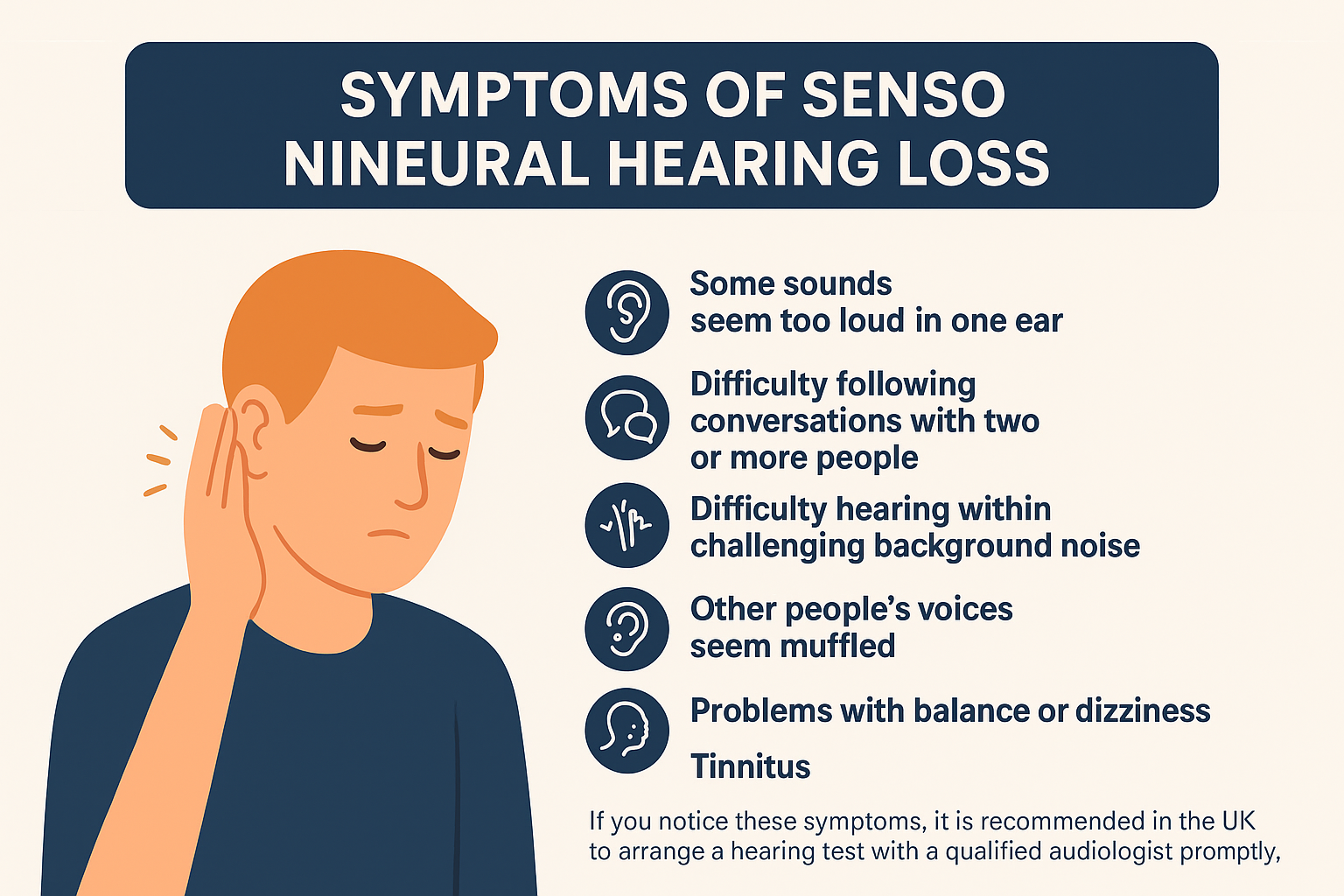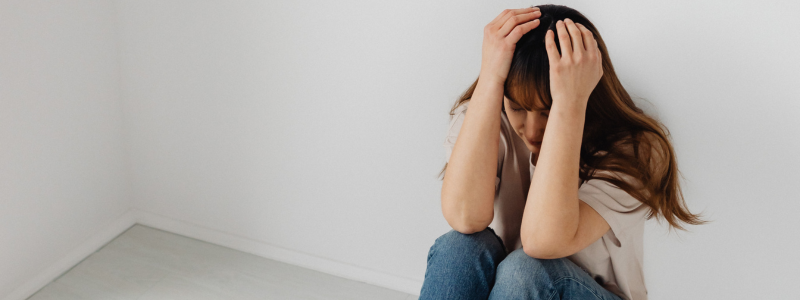
Head of Online Medical Content

Audiology Expert

Hearing Aids for Sensorineural Hearing Loss (SNHL)
Choosing the right hearing aids for this level of loss
Overview | What is sensorineural hearing loss? | Symptoms | Hearing aids for sensorineural hearing loss | Conclusion
Last Hearing Aid UK Update: 21
Overview
Hearing aids for sensorineural hearing loss increase sound volume to simply help you hear better using technology that offers sound adjustment, noise reduction, and improved speech clarity. They are available in various styles, including Behind-the-Ear and In-the-Ear device options.
In this article, we look at how hearing aids play an important role in managing sensorineural hearing loss, providing a valuable solution to improve the auditory experience and boost the overall quality of life.
Sensorineural hearing loss is common
Sensorineural hearing loss means you have damage in your inner ear or the auditory nerve, caused by ageing, exposure to loud noises, genetics, or underlying medical conditions.
This damage can cause challenges in processing sound signals, resulting in hearing loss that often affects the ability to hear high-pitched sounds or understand speech.
There are two types of sensorineural hearing loss: congenital (at birth) and acquired (after birth). Hearing aids are the most popular treatment, designed to increase sounds and improve the hearing at various frequencies. Early intervention with hearing aids can assist in maintaining social engagement, reducing mental effort, and enhancing general health, especially among seniors.

Symptoms of sensorineural hearing loss
If you notice these symptoms, it is recommended that you arrange a hearing test with a qualified audiologist promptly, as early support improves outcomes.
- Some sounds seem too loud in one ear
- Difficulty following conversations with two or more people
- Difficulty hearing within challenging background noise
- Other people’s voices seem muffled
- Problems with balance or dizziness
- Tinnitus

Types of Hearing Aids for Sensorineural Hearing Loss
Plus, the key features are beneficial for sensorineural hearing loss
What type of hearing aids support sensorial hearing loss?
Hearing aids for sensorineural hearing loss offer many benefits, enhancing hearing experiences while boosting overall quality of life. The following devices increase sound levels, making speech clearer and easier to distinguish.
BTE hearing aids (Behind-the-Ear)
These are a common and multi-purpose selection for those with sensorineural hearing loss. These devices rest comfortably behind the ear and are connected to an earpiece or earmold that fits inside the ear canal.
BTE hearing aids are appropriate for a range of degrees of hearing loss and offer features such as directional microphones and telecoil technology. In the UK, BTE aids are particularly recommended for older adults or those with dexterity issues, as they are easier to handle and maintain.
Related reading: Discover BTE hearing aids
ITE hearing aids (In the Ear)
These are custom-fitted devices that sit in the outer ear. They are particularly suitable for mild to moderate sensorineural hearing loss. ITE aids are discreet and often include fundamental parts, including microphones and amplifiers, within a shell that fits tightly in the ear. There are also rechargeable options available, ideal for those with dexterity problems.
Related reading: Discover ITE hearing aids
ITC and CIC hearing aids (In the Canal and Completely in the Canal)
These are all small models that are either partially or fully fit within the ear canal. They are suitable for mild to moderate sensorineural hearing loss and those who want prioritise discretion. However, there may be a technology limitations due to their size and extra maintenance might be needed due to sitting deeper in the canal.
Related reading: Discover CIC hearing aids
RIC hearing aids (Receiver in Canal)
They are small than BTE hearing aids and have a receiver that sits directly in the ear canal. The open-fit style reduces the occlusion effect and delivers a more natural sound experience.
RIC hearing aids are often suitable for mild to moderate sensorineural hearing loss and combine comfort, discretion, and access to advanced features such as Bluetooth streaming and app control.
Related reading: Discover RIC hearing aids
The hearing aid features that support sensorineural hearing loss
Digital Signal Processing (DSP): This analyses and adjusts incoming sounds in real time, supporting specific frequency needs, reducing background noise, and boosting clarity of speech.
Directional microphones: These focus on sounds coming from a particular direction while minimising background noise, improving speech understanding and overall listening comfort.
Feedback suppression: These reduce or eliminate unwanted noise, delivering a more comfortable and distortion-free listening experience.
Telecoil (T-Coil) technology: T-coil technology connects directly to hearing loop systems found in theatres, churches, or public spaces. This feature gives you a sharper and more direct listening experience.
Bluetooth connectivity: Bluetooth connectivity enables you to stream audio directly from compatible devices such as smartphones, TVs, or computers.
Adjusting to hearing aids for sensorineural hearing loss
While hearing aids for sensorineural hearing loss offer many advantages, they may take time to adjust to, as the brain gradually adapts to the amplified sounds provided by the hearing aids.
In conclusion
Is there a cure for sensorineural hearing loss? Unfortunately, there is no cure for sensorineural hearing loss; however, scheduled follow-up visits, treatment plans, and wearing hearing aids that are optimised for the best possible performance, by an audiologist, will greatly improve your quality of life.
Why Choose Us?
- FREE Hearing Tests
- Best Hearing Aids and Prices
- FREE Aftercare for Life
- FREE Home Visits
- 200+ Local Audiologists
- 60 Day Money Back Guarantee
Sensorineural hearing loss and hearing aids
Here, at Hearing Aid UK, we offer a wide range of hearing aids available on the market - such as hearing aids that can support sensorineural hearing loss. We provide support for your hearing healthcare in clinic or in the comfort of your own home and with nationwide coverage, we will have an audiologist near you.
Whatever your hearing loss level, budget, or style our audiologists can help you find the perfect hearing solution for you.
Call us free for support and advice on 0800 567 7621
Other hearing loss awareness articles you might like...
 Hearing aid stigma
Hearing aid stigma  The impact of diet on your hearing
The impact of diet on your hearing  How to tell if hearing loss is permanent or temporary
How to tell if hearing loss is permanent or temporary Our specialist service includes:
Do not spend hundreds of pounds without getting a second opinion from us.
Please call us on 0800 567 7621
 Not only are the prices great, but the service is fantastic! Many thanks to your team.
Not only are the prices great, but the service is fantastic! Many thanks to your team.What's included in our hearing aid prices?
Common FAQs about hearing aids for sensorineural hearing loss
Do hearing aids work for sensorineural hearing loss?
Hearing aids can significantly improve hearing and speech, especially for those with sensorineural hearing loss, which is caused by damaged hair cells or a damaged hearing nerve in the inner ear.
Does sensorineural hearing loss get worse over time?
Sensorineural hearing loss results from issues in the inner ear or auditory nerve and is typically permanent. The degree of loss can range from slight to profound, and in some instances, it may deteriorate over time.
What are the social effects of sensorineural hearing loss?
Hearing loss can impact both personal and professional aspects of life, leading to social withdrawal due to reduced access to services and challenges in communication. It may also cause emotional issues stemming from decreased self-esteem and confidence.
Other pages you might find useful
Ask the Experts
6 Morton Lane
Walkwood
Redditch
Worcestershire
B97 5QA
Latest Launch
When we refer to a product as 'Latest Launch', we mean it is the latest to be released on the market.
New
When we refer to a product as 'New', we mean that the product is the newest hearing aid model on the market.
When we refer to a product as 'Superseded', we mean that there is a newer range available which replaces and improves on this product.
Older Model
When we refer to a product as an 'Older Model', we mean that it is has been superseded by at least two more recent hearing aid ranges.
